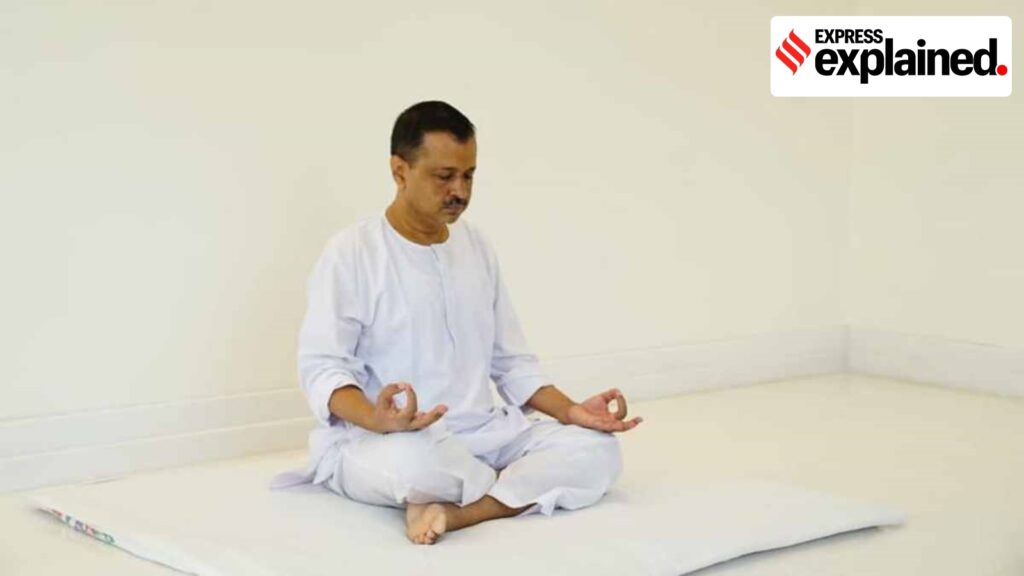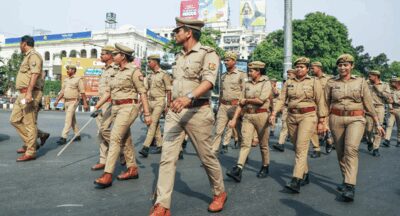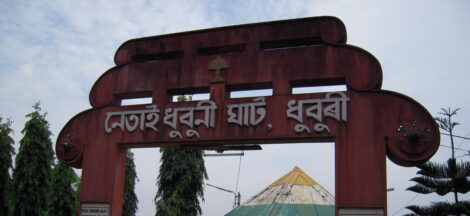Arvind Kejriwal, the Aam Aadmi Party leader and former Chief Minister of Delhi, has embarked on a 10-day Vipassana meditation retreat in Punjab’s Hoshiarpur district. His arrival, accompanied by a notably large convoy, has sparked criticism from various quarters, including political opponents and members of his own party.
Kejriwal, along with his wife Sunita, commenced the meditation course at the Dhamma Dhaja Vipassana Centre near Hoshiarpur. The retreat, which began on Wednesday, is part of Kejriwal’s regular practice of Vipassana, a meditation technique he has followed for several years. This practice involves periods of complete isolation and self-observation, aiming to promote mental clarity and inner peace.
However, the focus has shifted from his meditative pursuits to the scale of his security detail. Observers noted that Kejriwal’s convoy comprised numerous vehicles, a spectacle that did not go unnoticed. AAP MP Swati Maliwal took to social media, humorously commenting that the convoy appeared “bigger than Donald Trump’s.” This remark underscores the perceived opulence of the procession, contrasting sharply with AAP’s foundational principles of simplicity and anti-VIP culture.
Criticism also emanated from political adversaries. Leaders from both the Bharatiya Janata Party and the Congress questioned the necessity and appropriateness of such a grand convoy, especially for a leader who currently holds no official governmental position. They accused Kejriwal of indulging in the very VIP culture he once vehemently opposed. BJP leader Manjinder Singh Sirsa accused Kejriwal of wasting public funds, highlighting the perceived hypocrisy in his actions.
In response to these allegations, AAP representatives defended the security arrangements, stating that Kejriwal is entitled to Z-plus security cover as approved by the Ministry of Home Affairs. They argued that the convoy’s size was in line with the security protocols mandated for an individual of his stature and past threats to his safety.
This incident has reignited debates about the evolving dynamics within AAP. Founded on principles of austerity and a rejection of traditional political privileges, the party’s leadership now faces scrutiny over actions that appear to contradict these ideals. Maliwal’s public critique is particularly significant, reflecting internal discontent. She previously expressed concerns about the party’s direction, drawing parallels between current leadership behaviors and the abandonment of ethical values in pursuit of material gains.
Kejriwal’s commitment to Vipassana is well-documented. He has attended several such retreats in the past, often after intense political campaigns or during periods of personal reflection. For instance, after the 2014 Lok Sabha elections and the 2013 Delhi Assembly elections, he took breaks to practice Vipassana. Similarly, following the campaign for the Bawana bypolls, where AAP secured a victory, he attended a meditation retreat in Maharashtra.
The timing of this retreat is noteworthy. It comes amid internal challenges within AAP, including allegations of misconduct against senior party members and a recent electoral setback in the Delhi Assembly elections. Observers speculate that Kejriwal’s retreat serves both as a personal respite and a strategic pause to contemplate the party’s future course.
Vipassana, an ancient Indian meditation technique, requires practitioners to abstain from any form of communication, including talking or gestures, for an extended period. The practice aims to cultivate mindfulness and equanimity, qualities that are arguably essential for leaders navigating the tumultuous landscape of Indian politics.
As Kejriwal immerses himself in meditation, the discourse surrounding his convoy underscores the delicate balance political figures must maintain between personal practices and public perceptions. The criticism from both allies and adversaries highlights the expectations placed on leaders to embody the ideals they espouse, especially those rooted in simplicity and integrity.




 Unregistered Madrasas Sealed in Dehradun in Crackdown
Unregistered Madrasas Sealed in Dehradun in Crackdown 